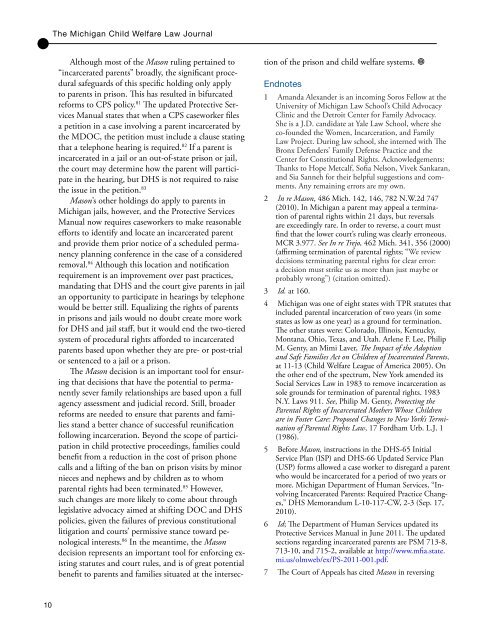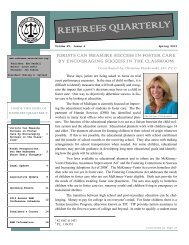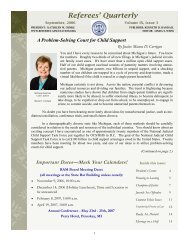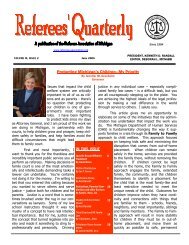The Michigan Child Welfare Law Journal - Referees Association of ...
The Michigan Child Welfare Law Journal - Referees Association of ...
The Michigan Child Welfare Law Journal - Referees Association of ...
You also want an ePaper? Increase the reach of your titles
YUMPU automatically turns print PDFs into web optimized ePapers that Google loves.
•<br />
<strong>The</strong> <strong>Michigan</strong> <strong>Child</strong> <strong>Welfare</strong> <strong>Law</strong> <strong>Journal</strong><br />
Although most <strong>of</strong> the Mason ruling pertained to<br />
“incarcerated parents” broadly, the significant procedural<br />
safeguards <strong>of</strong> this specific holding only apply<br />
to parents in prison. This has resulted in bifurcated<br />
reforms to CPS policy. 81 <strong>The</strong> updated Protective Services<br />
Manual states that when a CPS caseworker files<br />
a petition in a case involving a parent incarcerated by<br />
the MDOC, the petition must include a clause stating<br />
that a telephone hearing is required. 82 If a parent is<br />
incarcerated in a jail or an out-<strong>of</strong>-state prison or jail,<br />
the court may determine how the parent will participate<br />
in the hearing, but DHS is not required to raise<br />
the issue in the petition. 83<br />
Mason’s other holdings do apply to parents in<br />
<strong>Michigan</strong> jails, however, and the Protective Services<br />
Manual now requires caseworkers to make reasonable<br />
efforts to identify and locate an incarcerated parent<br />
and provide them prior notice <strong>of</strong> a scheduled permanency<br />
planning conference in the case <strong>of</strong> a considered<br />
removal. 84 Although this location and notification<br />
requirement is an improvement over past practices,<br />
mandating that DHS and the court give parents in jail<br />
an opportunity to participate in hearings by telephone<br />
would be better still. Equalizing the rights <strong>of</strong> parents<br />
in prisons and jails would no doubt create more work<br />
for DHS and jail staff, but it would end the two-tiered<br />
system <strong>of</strong> procedural rights afforded to incarcerated<br />
parents based upon whether they are pre- or post-trial<br />
or sentenced to a jail or a prison.<br />
<strong>The</strong> Mason decision is an important tool for ensuring<br />
that decisions that have the potential to permanently<br />
sever family relationships are based upon a full<br />
agency assessment and judicial record. Still, broader<br />
reforms are needed to ensure that parents and families<br />
stand a better chance <strong>of</strong> successful reunification<br />
following incarceration. Beyond the scope <strong>of</strong> participation<br />
in child protective proceedings, families could<br />
benefit from a reduction in the cost <strong>of</strong> prison phone<br />
calls and a lifting <strong>of</strong> the ban on prison visits by minor<br />
nieces and nephews and by children as to whom<br />
parental rights had been terminated. 85 However,<br />
such changes are more likely to come about through<br />
legislative advocacy aimed at shifting DOC and DHS<br />
policies, given the failures <strong>of</strong> previous constitutional<br />
litigation and courts’ permissive stance toward penological<br />
interests. 86 In the meantime, the Mason<br />
decision represents an important tool for enforcing existing<br />
statutes and court rules, and is <strong>of</strong> great potential<br />
benefit to parents and families situated at the intersection<br />
<strong>of</strong> the prison and child welfare systems. <br />
Endnotes<br />
1 Amanda Alexander is an incoming Soros Fellow at the<br />
University <strong>of</strong> <strong>Michigan</strong> <strong>Law</strong> School’s <strong>Child</strong> Advocacy<br />
Clinic and the Detroit Center for Family Advocacy.<br />
She is a J.D. candidate at Yale <strong>Law</strong> School, where she<br />
co-founded the Women, Incarceration, and Family<br />
<strong>Law</strong> Project. During law school, she interned with <strong>The</strong><br />
Bronx Defenders’ Family Defense Practice and the<br />
Center for Constitutional Rights. Acknowledgements:<br />
Thanks to Hope Metcalf, S<strong>of</strong>ia Nelson, Vivek Sankaran,<br />
and Sia Sanneh for their helpful suggestions and comments.<br />
Any remaining errors are my own.<br />
2 In re Mason, 486 Mich. 142, 146, 782 N.W.2d 747<br />
(2010). In <strong>Michigan</strong> a parent may appeal a termination<br />
<strong>of</strong> parental rights within 21 days, but reversals<br />
are exceedingly rare. In order to reverse, a court must<br />
find that the lower court’s ruling was clearly erroneous.<br />
MCR 3.977. See In re Trejo, 462 Mich. 341, 356 (2000)<br />
(affirming termination <strong>of</strong> parental rights; “We review<br />
decisions terminating parental rights for clear error:<br />
a decision must strike us as more than just maybe or<br />
probably wrong”) (citation omitted).<br />
3 Id. at 160.<br />
4 <strong>Michigan</strong> was one <strong>of</strong> eight states with TPR statutes that<br />
included parental incarceration <strong>of</strong> two years (in some<br />
states as low as one year) as a ground for termination.<br />
<strong>The</strong> other states were: Colorado, Illinois, Kentucky,<br />
Montana, Ohio, Texas, and Utah. Arlene F. Lee, Philip<br />
M. Genty, an Mimi Laver, <strong>The</strong> Impact <strong>of</strong> the Adoption<br />
and Safe Families Act on <strong>Child</strong>ren <strong>of</strong> Incarcerated Parents,<br />
at 11-13 (<strong>Child</strong> <strong>Welfare</strong> League <strong>of</strong> America 2005). On<br />
the other end <strong>of</strong> the spectrum, New York amended its<br />
Social Services <strong>Law</strong> in 1983 to remove incarceration as<br />
sole grounds for termination <strong>of</strong> parental rights. 1983<br />
N.Y. <strong>Law</strong>s 911. See, Philip M. Genty, Protecting the<br />
Parental Rights <strong>of</strong> Incarcerated Mothers Whose <strong>Child</strong>ren<br />
are in Foster Care: Proposed Changes to New York’s Termination<br />
<strong>of</strong> Parental Rights <strong>Law</strong>, 17 Fordham Urb. L.J. 1<br />
(1986).<br />
5 Before Mason, instructions in the DHS-65 Initial<br />
Service Plan (ISP) and DHS-66 Updated Service Plan<br />
(USP) forms allowed a case worker to disregard a parent<br />
who would be incarcerated for a period <strong>of</strong> two years or<br />
more. <strong>Michigan</strong> Department <strong>of</strong> Human Services, “Involving<br />
Incarcerated Parents: Required Practice Changes,”<br />
DHS Memorandum L-10-117-CW, 2-3 (Sep. 17,<br />
2010).<br />
6 Id; <strong>The</strong> Department <strong>of</strong> Human Services updated its<br />
Protective Services Manual in June 2011. <strong>The</strong> updated<br />
sections regarding incarcerated parents are PSM 713-8,<br />
713-10, and 715-2, available at http://www.mfia.state.<br />
mi.us/olmweb/ex/PS-2011-001.pdf.<br />
7 <strong>The</strong> Court <strong>of</strong> Appeals has cited Mason in reversing<br />
10







